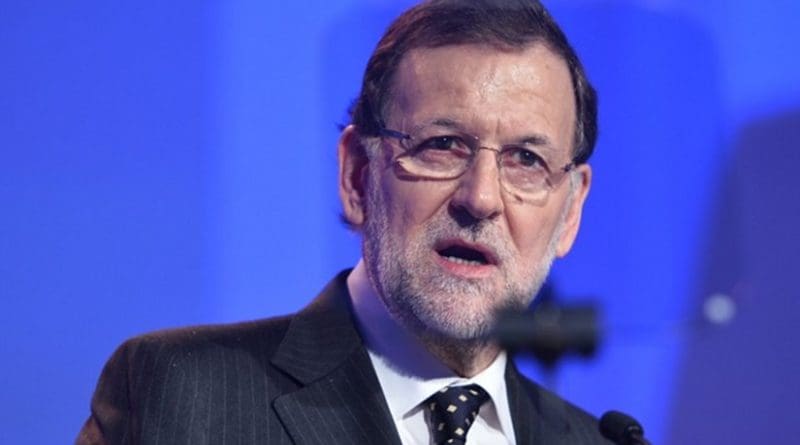Spain’s Left-Wing Parties Reject New Rajoy Government
By EurActiv
(EurActiv) — Spain’s two biggest left-wing parties ruled out supporting a government led by the ruling People’s Party (PP) on Monday, complicating Prime Minister Mariano Rajoy’s efforts to build a coalition to stay in power after a tight general election.
Parties began staking out positions for what are expected to be weeks of complex talks on forming a government after Rajoy’s centre-right PP won most votes in Sunday’s election but fell well short of the 176 seats needed for a parliamentary majority.
Two newcomers – leftist anti-austerity Podemos (“We can”) and the liberal Ciudadanos (“Citizens”) – entered the mainstream for the first time, ending domination by the PP and Socialists stretching back to soon after dictator Francisco Franco’s death in 1975.
The two parties won scores of seats in parliament, tapping widespread anger over a recently-ended economic slump and high-level corruption in the European Union’s fifth-largest economy.
The close vote, which put the Socialists in second place ahead of Podemos and Ciudadanos, makes it extremely difficult for any party to win majority support, raising the possibility of a deadlock that could force new elections in the new year.
Markets were spooked by the political uncertainty and nervous investors moved out of Spanish assets, sending the country’s shares lower and benchmark bond yields higher.
As leader of the largest party, Rajoy gets first chance to try to reach an agreement with other parties that would allow him to govern. But the Socialists and Podemos quickly said that they would reject a new government led by the 60-year-old Rajoy.
“Podemos would not permit a PP government, either actively or passively,” Podemos leader Pablo Iglesias told reporters, meaning that his party will neither vote for PP rule nor abstain in a parliamentary vote on a new government.
Senior Socialist official Cesar Luena said his party would vote ‘no’ to a government headed by Rajoy and the PP.
Left-wing option
The two left-wing parties won 159 seats between them in the 350-seat parliament, and with Catalan nationalists likely to join them in opposing the PP, it appears to make it virtually impossible for the PP, which won 123 seats, to construct a majority.
That could open the prospect of a left-wing coalition, similar to what happened in neighbouring Portugal, where the incumbent conservatives won an October election but a Socialist government backed by far-left parties was sworn in.
However, it is not easy for the left-wing parties to build a majority either.
Albert Rivera, leader of business-friendly Ciudadanos, which won 40 seats in parliament, came out in support of a PP minority government, which would negotiate with Ciudadanos, the Socialists and Podemos to support it in votes on different laws.
Rivera said a left-wing coalition of up to 11 parties would not be viable.
“Spain cannot allow itself to be Greece, Spain cannot allow itself to be a chaotic country,” he told Telecinco TV.
A top PP official said the negotiations could undermine Spain’s fledgling economic recovery. The country is now one of the fastest-growing economies in the euro zone after a long financial crisis, though unemployment remains above 20 percent.
“I am asking everyone to show responsibility, because the stability of Spain is at stake, progress in the economic recovery is at stake,” the PP’s Fernando Martinez-Maillo told Cadena Ser radio.
Ratings agency Moody’s said the political uncertainty could put the brakes on a long-awaited rating upgrade.
Reflecting the concerns of foreign investors, Markus Kerber, director-general of the BDI Federation of German Industries, urged Spain’s new government to “stay the course” on economic policy.
The close result magnifies the importance of small separatist parties from Catalonia, which could try to extract concessions such as the promise of an independence referendum as the price for their support.
Also at stake is whether Spain continues to follow the belt-tightening measures to cut its budget deficit that the PP credits for helping end the recession.
Both Podemos and the Socialists have pledged to slow the pace of deficit-cutting if they gain power.

